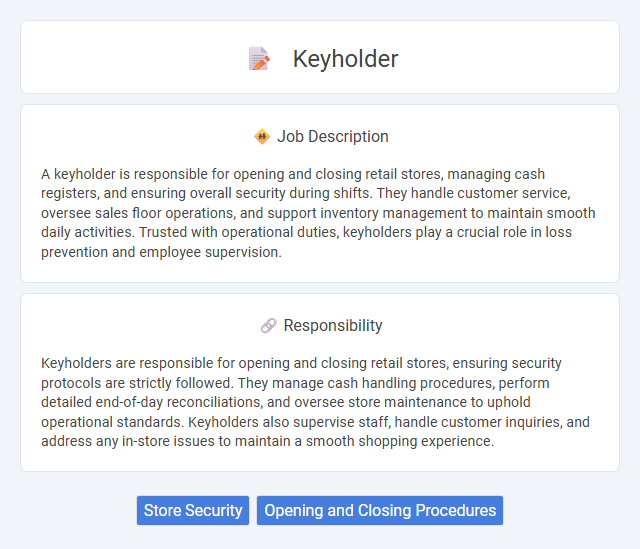
A keyholder is responsible for opening and closing retail stores, managing cash registers, and ensuring overall security during shifts. They handle customer service, oversee sales floor operations, and support inventory management to maintain smooth daily activities. Trusted with operational duties, keyholders play a crucial role in loss prevention and employee supervision.
Individuals who are responsible, trustworthy, and capable of handling responsibility will likely be suitable for a keyholder job, as it often involves opening and closing the premises and managing security protocols. Those who work well under pressure and have excellent organizational skills may have a higher probability of succeeding in this role. Conversely, people who struggle with punctuality or attention to detail might face challenges in meeting the requirements of a keyholder position.
Qualification
Keyholder qualifications include strong organizational skills, reliability, and experience with cash handling and security protocols to ensure efficient store operations. Candidates should demonstrate excellent customer service abilities, proficiency in point-of-sale systems, and the capacity to manage opening and closing procedures independently. Prior retail experience and leadership capabilities are highly valued to oversee team members and maintain store standards effectively.
Responsibility
Keyholders are responsible for opening and closing retail stores, ensuring security protocols are strictly followed. They manage cash handling procedures, perform detailed end-of-day reconciliations, and oversee store maintenance to uphold operational standards. Keyholders also supervise staff, handle customer inquiries, and address any in-store issues to maintain a smooth shopping experience.
Benefit
Keyholder positions often provide the benefit of increased responsibility, which can enhance leadership skills and improve career prospects. Employees in this role may have the opportunity for flexible scheduling, leading to better work-life balance. There is also a probable benefit of higher pay or bonuses associated with the added duties of managing store security and opening or closing procedures.
Challenge
The keyholder job likely involves managing security responsibilities and overseeing access control, which can present challenges related to accountability and trustworthiness. Handling customer issues and operational tasks may require quick decision-making under pressure, increasing the complexity of daily duties. There is a probability that balancing these responsibilities demands strong organizational skills and the ability to stay composed in unexpected situations.
Career Advancement
Keyholders play a critical role in retail management, responsible for store security, cash handling, and opening or closing procedures, which provides essential leadership experience. Gaining expertise as a keyholder enhances skills in team supervision, loss prevention, and operational efficiency, making candidates strong contenders for assistant manager and store manager roles. Career advancement in this path often involves mastering inventory control, staff training, and customer service strategies to support store profitability and growth.
Key Terms
Store Security
Keyholders play a crucial role in maintaining store security by responsibly managing opening and closing procedures, ensuring all entry points are secured. They monitor surveillance systems and promptly address any suspicious activity to prevent theft or vandalism. Their presence guarantees adherence to safety protocols, contributing to the overall protection of merchandise and staff.
Opening and Closing Procedures
Keyholders are responsible for executing precise opening and closing procedures to ensure the security and operational readiness of the establishment. The role includes unlocking and locking all entry points, disarming or activating alarm systems, and conducting thorough inspections to verify that premises meet safety standards before opening and after closing. Efficient management of cash registers, securing confidential documents, and reporting any irregularities are critical components of the keyholder's accountability during these procedures.
 kuljobs.com
kuljobs.com